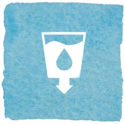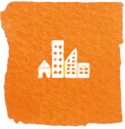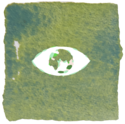Autarky – ultimate convenience in a one-stop solution

Eawag develops technologies for the decentralised treatment of wastewater in locations with no sewers or mains water supply. These technologies are not only of interest in the Global South.
Almost half of the world’s population lacks access to adequate sanitation – no toilets and no means of washing their hands. This state of affairs has serious consequences for people's health as well as for the environment, and primarily affects countries in the Global South, particularly in fast-growing cities and informal settlements that are not – or cannot be – connected to the mains water supply and sewage system. In areas that suffer from water shortages, however, sanitation becomes a challenge even for large cities with good infrastructure. One solution comes in the form of decentralised systems that are not connected to the water or sewer network and that use treated wastewater as an alternative water source. As part of the Bill & Melinda Gates Foundation’s "Reinvent the Toilet Challenge", Eawag has developed such a system in collaboration with the Austrian design firm EOOS, the Paul Scherrer Institute (PSI) and the University of Applied Sciences Northwestern Switzerland (FHNW).
All the conveniences of a “normal” toilet: the Autarky toilet cabin, complete with a separation toilet (not shown), urinal and washbasin (Photo: Aldo Todaro, Eawag).
Closed cycles
“Autarky” – as the researchers have named their development – is essentially a toilet and wastewater treatment plant in one. Complete with a handwashing station, the toilet is equipped with three modules for the separate treatment of wastewater, urine and faeces, and operates self-sufficiently – that is, with no connection to the mains water supply or sewer network. During the treatment of urine and faeces, unpleasant odours are absorbed, pathogens are destroyed, and nutrients are recovered that can then be used as fertiliser in agriculture. The wastewater from toilet flushing and the sink is treated in a four-stage process in the water module – also known as the Water Wall. First, microorganisms break down soap and any residues of urine and faeces. Next the water is filtered through a membrane that retains microorganisms, before an active carbon filter and an electrochemical treatment process remove turbidity and colour – along with the last traces of organic impurities – and disinfect the water. “A lot of fundamental research has gone into developing this combination of biological treatment and membrane filtration,” says Eberhard Morgenroth, head of the Process Engineering department at Eawag and professor at the Department of Civil, Environmental and Geomatic Engineering at ETH Zurich. “A further challenge was to develop a system that was as robust as possible and required only minimal maintenance. The fewer buttons and sensors, the less fault-prone the operation – which is vital at remote locations.”
In the Autarky Water Wall, water from handwashing and toilet flushing is recirculated in a closed loop. At the heart of the treatment process is an aerated bioreactor (1), in which impurities from soap, urine and faeces are broken down by microorganisms in the first stage of the process. Controlling the aeration rate allows for complete breakdown of nitrogen compounds into molecular nitrogen (through nitrification and denitrification). In the second step, gravity is used to filter the water through an ultrafiltration membrane (2) that retains pathogenic organisms. The third step is an active carbon filter (3) that removes turbidity and colour to improve aesthetic water quality. In the fourth and last stage, an electrolysis cell (4) ensures that even the last traces of organic contamination are removed. Instead of adding chemicals for disinfection, the toilet uses dissolved chloride ions, that are converted into chlorine in the electrolysis cell. This prevents the water from becoming contaminated with microorganisms again during storage.
(Graphic: Peter Penicka, Eawag)
A contribution to the SDGs:



Created by Isabel Plana for the Info Day Magazine 2023


